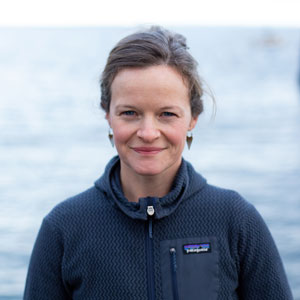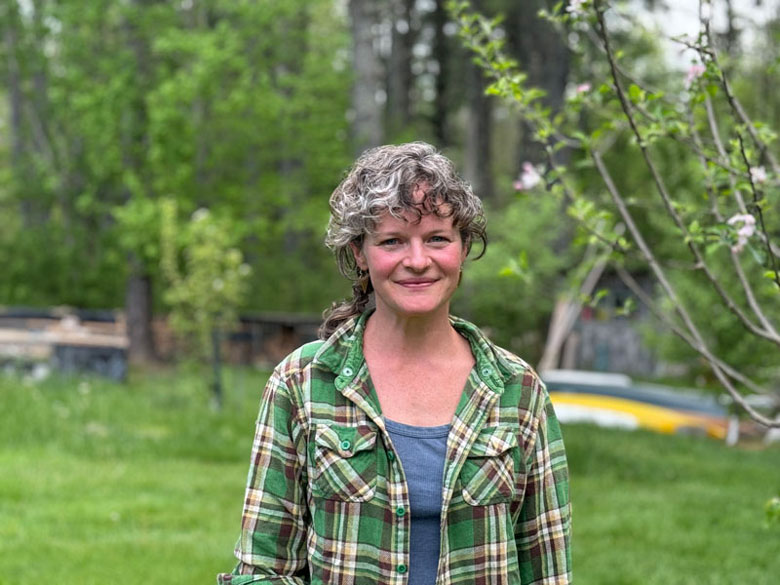To connect with others is a deeply human experience, and Christa Thorpe has been fostering those connections her whole life through roles as teacher, community development coordinator at Island Institute, school committee member, and chairwoman of a town broadband committee.
Thorpe, of Bremen, has a deep family history in Lincoln County, which she said started as far back as the 1767 marriage of Samuel and Elizabeth Pierce on Monhegan Island. In 1829, her father’s side of the family arrived in Christmas Cove in South Bristol and have been on the peninsula ever since.
“I feel very rooted here, although I didn’t always,” she says.
After being born in Bath, Thorpe spent her first eight years in Bangladesh, a nation east of India along the Bay of Bengal, where her parents were serving in a ministry organization working on educational projects related to art and music.
“Anyone who is drawn to teaching cares about the community, but specifically the future of their community.”
“Growing up, I felt fairly bicultural,” she says. “I felt fairly at ease in Asia, and I ended up going back later in life for a couple of different reasons. Coming home to Maine was just as much home as the very busy streets of Dhaka,” the capital city of Bangladesh and one of the most populous cities in the world.
When her family returned to Lincoln County, she attended Great Salt Bay Community School in Damariscotta and graduated from Lincoln Academy in Newcastle in 2005.

After high school, Thorpe attended Wheaton College in Illinois, where she intended to further her studies in music: a lifelong passion she’s had particularly for playing the flute, having grown up in a musical home. Her father was a band teacher, so there were always instruments around.
The Midwest was a culture shock.
“Losing the ocean was disorienting,” she said. “The lake helped, it looked like the ocean but didn’t smell like the ocean.”
On top of disorientation, Thorpe wasn’t thrilled with the classical approach to her course of study, so she switched focus and graduated with a degree in anthropology. She then earned a master’s degree in intercultural studies and teaching English as a second language, a way to make her anthropology degree marketable.
The job she got was back in Bangladesh, where she taught English as a second language and directed curriculum at Asian University for Women.
During a weeklong trip to Chicago for a friend’s wedding, she experienced homesickness for Maine so intense it altered the direction of her life.
“You go where the jobs are,” she said. “And that was a defining moment: I wanted to choose where I lived. So I came back.”
Thorpe began working at Lincoln Academy in 2013 teaching English as a second language and helping the school develop its curriculum for new international boarding students.
“I felt honored to become colleagues with the people who had been my beloved teachers,” she said.
In 2016, she left teaching to engage with the community outside of school. Her partner and future husband, Bennett Collins, was leasing farmland in Bremen and running a wood-fired catering business, Harvest Moon Pizza.
“I had the opportunity to plug in and support some formative years of that small business, but also get my hands in the soil and help learn about gardening and raising animals,” she said. “I got to just be free for a few years and figure out my next step.”
In 2017, Thorpe joined the Bremen School Committee because she wanted to continue to be involved in education even outside of the classroom.
“As soon as I stopped teaching, it was like, ‘How do I remain involved in supporting education in this community, which I care deeply about?’” She is serving her third, three-year term on the committee.
She also joined the Bremen Conservation Committee, a committee focused on the conservation and well-being of Bremen’s flora and fauna, from 2014 until 2019.
Thorpe began her position at Island Institute (publisher of The Working Waterfront) in 2019 as a community development officer. The organization’s mission is to build community sustainability in island and coastal communities and share solutions for addressing the coast’s most critical issues.
Her departure from the conservation committee was to focus on the Bremen Broadband Committee after she saw the town’s need for a high-speed internet infrastructure.
Thorpe’s sense of obligation to work with and in the community is one she suspects is in her DNA, but it’s also something in the DNA of being a teacher.
“Anyone who is drawn to teaching cares about the community, but specifically the future of their community,” she said.
This notion is what may have drawn her to help set up broadband infrastructure in the town. A project that wasn’t just about connecting Bremen to the world, but the world to Bremen.
“Peggy Schaefer, the former director of ConnectMaine, said download is how the world talks to Maine and upload is how Maine talks to the world,” she said. “That’s a big part of what drew me to the mission of Island Institute, is that piece of being able to empower communities to drive solutions and then share those out.”
Outside of her work on town committees and at Island Institute, Thorpe continues to play music with the Seacoast Community Orchestra in Damariscotta, and enjoys spending time with her partner and children in Bremen and working with the land they steward.
One of her favorite crops to grow is flint corn, a variety grown by Abenaki people throughout New England. She loves the plant because of its “deep roots” in New England and the story is its resilience and connection.
Abenaki flint corn was the only crop that survived 1817, a year where there was a frost every month in the year because of a cloud of volcanic ash spewing from Europe. For Thorpe, the plant’s story is a cautionary tale about how everything is interconnected.
“People say ‘Let’s keep Maine the best kept secret,’ but we can’t, we are so interconnected, a volcano somewhere else caused a frost every month of the year,” she said. “We are not isolated.”
This story first appeared in the Lincoln County News and is reprinted here with permission and gratitude.





